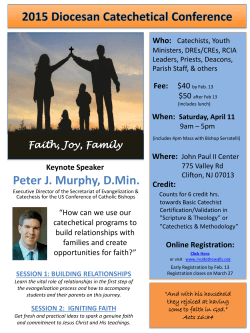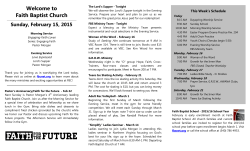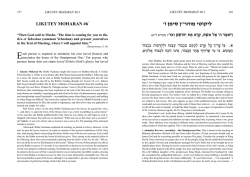
"Hester Panim" and God`s Presence in the Holocaust Part 2 By Rav
"Hester Panim" and God's Presence in the Holocaust Part 2 By Rav Tamir Granot B. The Rebbe of Klausenburg: "No place is devoid of Him" – God exists in Auschwitz Rabbi Rabinowitz wrote his Binat Nevonim some forty years after giving up his position as Rebbe of Munkacs, and he makes no claim that his book presents a specifically Chassidic world-view. Let us see how the Rebbe of Klausenburg (Sanz) addresses the same existential problem, but as someone who continued to be a leader of chassidut even after the Holocaust, establishing Chassidic centers and viewing the rehabilitation of chassidut as his life's mission. First of all, it is necessary to understand why chassidut faced an almost impossible theological and existential crossroads in the wake of the Holocaust. For chassidim, the assumption of Divine immanence (i.e., His Presence within this world, as manifest within reality) is the very core of the religious experience and the primary meaning of Divine worship. The faith that God "fills all the worlds" (Tikkunei Zohar 5a, 6b) and that "there is no place that is devoid of Him" (ibid. 91b, 122b) is the gateway to drawing close to Him. It is this belief that gives meaning to prayer, to love of God, to one's attitude towards the world, and to everything that a religious Jew is involved in. Therefore, the religious concept of hester panim (the hiding of God's face), in its simplistic sense, is inconceivable. On the other hand, the possibility that God is here with us while tremendous horror is going on seems equally inconceivable. This conundrum of faith seems insoluble. How, then, can we preserve the Chassidic religious experience and the tenets of its faith without suppressing the significance of the Holocaust? The Rebbe of Klausenburg offers the following insight: One… who reaches such a level fulfills the verse, "Even though I walk in the valley of the shadow of death, I fear no evil because You are with me" (Tehillim 23:4). For the whole world is full of His glory, and no matter where I go, He fills all the worlds, and even in She'ol that is beneath, and in the depths of She'ol, and in the kelippot (husks or shells), there is no place that is devoid of Him. With this knowledge and awareness, [this person] is not afraid of anything except God… and God will do what is good in His eyes. This is known to every Jew and to anyone with even the tiniest spark of faith in God. (Shefa Chayim, Divrei Torah 14, vol. 5788, Chanuka ) The Chassidic assumption of divine immanence assumes here psychological and existential significance, and God's Presence becomes meaningful in a very personal way.[1] God is present and is watching and is able to save us; therefore, a person with faith has no reason to fear anything – even in the very depths of She'ol. Although the Rebbe presents this level of religious faith as an obvious fact that is known to every Jew, he is clearly describing a supreme religious experience. And as noted above, the greater the chasm separating the absurd picture presented by reality and the perception demanded by faith, the greater the existential and religious challenge. How can such a religious experience be anchored – or even entertained at all – in a reality so full of injustice and horror? The Rebbe of Klausenburg does not retreat into ideological theory, but proposes ways of dealing with this existential challenge based on his own experience: If [the believer] is put to this test and he fortifies his faith, then he cannot be punished; if despite his disturbing thoughts he rallies with all his might so as not to fall into despair, and repeats to himself with joy and strength, "God will help; God will help! He – blessed be His Name – is with me at all times; He will not forsake me, nor will He abandon me"… It is an important principle in the Torah to fulfill the verse, "I place God before me always," [meaning,] that one should always see before his eyes the Name Y-H-V-H, blessed be He and blessed be His Name, and in all of one's endeavors and in all of his ways, he should trust in Him alone. (ibid.) The first piece of advice is to repeat simple statements of faith to give oneself encouragement and to suppress the disturbing thoughts of despair. The second piece of advice speaks of focusing on God's Name – imagining the letters in one's mind. The mind's concentration on the letters serves to orientate one's entire personality, arousing the feeling of closeness. The Rebbe's own experience during the period of the Holocaust was one of constant Divine Providence, not one of hester panim. The sense of God's Presence hovering over him and accompanying him even through the valley of death was not an ideology that developed only later on; it is unquestionably an existential fact, not mere theory: When he stepped inside the gates of the camp, and noticed three young Torah scholars in front of him who had arrived together with his "transport," he immediately began telling them holy words [of Torah], and to fortify their faith, and to accept their suffering with love. In the midst of speaking to them, he asked them with great emotion: "Do you believe that the Creator, blessed be His Name, is here with us?" At once, the young men answered and called out together: "We believe it!" Again the Rebbe called out to them, with growing fervor: "Then remember it well and do not forget. For the Creator of all worlds is here with us, and He will redeem us… I promise you that in the merit of this faith, you too will be redeemed, and will merit to be liberated and to emerge from here alive…"[2] For the Rebbe, the faith that God is with us is not the question, but rather the solution. Moreover, it is the only way of surviving the storm. This does not imply that such faith is to be taken for granted, or that it comes automatically. The Rebbe himself had to work on fortifying his faith, and the excerpt above describes his attempt to strengthen the faith of others. The experience of closeness to God is expressed not only at the extreme crossroads of "to be or not to be," but also in other areas. One example is the ability, in the midst of the inferno, to arrive at intense closeness to God, despite the complete erasing of any objective religious context. Holocaust survivors who were in the camp together with the Rebbe have recounted how, on Shemini Atzeret of the year 5705 (1944), he found some way to evade going out to work. When the other prisoners returned to the camp, they found him engaged in an ecstatic dance of hakafot, with some torn pages from a Mishna in his hand instead of a Sefer Torah. Such ecstatic dancing characterized him throughout his life, even in his old age.[3] What makes this description special, of course, is its broader context: that he achieved such a psychological, physical and experiential state even in the midst of Auschwitz, and in such a deplorable state of health and malnourishment – all out of sense that God was with him. The following is another story that he told about his first days in Auschwitz. It, too, shows the existential importance of faith in God's closeness: I arrived in Auschwitz… It was Erev Shabbat; a Friday morning at 10 AM… After we arrived, they gave out food to people who were picked out as being fit for work. It was some meaty food for breakfast, and everyone jostled to get a share… They encouraged me to come and eat what was being handed out, but I said that under no circumstances would I eat the nonkosher food of this wicked one who had taken from me all that I had… under no circumstances would I eat non-kosher food… and thus I quite simply maintained a fast all of that Friday… By evening I was already very hungry and weak… Again the next day, on Shabbat, I heard them shouting and announcing to come and eat… but I didn't go… So I sat, brooding alone… When the barracks emptied out and no one remained, I suddenly burst into rivers of tears – although I was not one to weep, for I had taken upon myself to accept with love whatever would happen, as God has commanded us. But at noon on that Shabbat I burst into terrible weeping. I said, "Master of the universe, I am left alone and with nothing. You have taken everything from me… I am left solitary and bare – on top of all of that, should I go and eat non-kosher food?! I do not wish to eat non-kosher food! I'm not eating it!" As I sat alone speaking like this, a frightened man entered the barracks and came directly to me, asking: "Are you the Rebbe of Klausenburg?" The very question caused me fright, since the murderers usually led the rabbis and scholars first to the ovens… But as we spoke, someone else came and called to me: "You have to come right now; right by the door there is someone waiting for you…" I had no choice but to go to the door, although I feared that perhaps it was the kapo or one of the S.S. men, and here I had no possibility of escaping or hiding… But when I drew close to the door, I saw an elderly Jewish man who asked me, in these words: "Was the Rebbe of Kashanov your uncle?" I stood confounded… How did this person know about me, that I was here, in Auschwitz? And how did he know that the holy Rabbi David of Kashanov, may his memory protect us, was my uncle? Of course, I answered, "That's true – the Rabbi of Kashanov was my uncle…" He quickly handed me a loaf of bread and a bowl full of jelly, saying: "I brought it so you would have something to eat; I brought it so you could keep yourself going…" And in the blink of an eye this mysterious person disappeared… I never saw him again… I saw then, quite tangibly, that there is a God in the world… and I was vindicated (also in the eyes of those around me, who had previously adjured me not to keep myself distant from the foods prepared by the wicked ones) for not having wanted to eat non-kosher food… And then I accepted upon myself anew that come what may, under no circumstances would I eat nonkosher food… especially when the Holy One, blessed be He, was arranging food for me… Afterwards, I recited a blessing over the bread, and found water to wash my hands, and I sat down to eat a Shabbat meal… Throughout the year that I spent imprisoned by the Nazis, may their names be blotted out, I ate no non-kosher food, despite everything that happened to me in the camp. And even without desecrating Shabbat… and Heaven protected me, none of the wicked ones found out who I was… I had already been, on a few occasions, like someone walking in between life and death; they wanted to annihilate me… but I saw with my very senses that the Holy One, blessed be He, protects and saves those who observe and study the Torah, and the merit of my forefathers also protected me…" [4] The faith in God's Providence assumes a very tangible expression here in the personal miracle that the Rebbe experienced, according to his description, making it possible for him to survive. On the purely halakhic level, the Rebbe maintained that it was completely permissible – even obligatory – to eat the nonkosher food. The exception that he made for himself and the risk that he took upon himself arose from the subjective feeling that God was watching over him and taking care of his needs. Such foods bring impurity and dullness, even when it is permissible to eat them. If my soul recoils at them, then my subjective faith concludes that God will surely not cause me to stumble. In summary, in the view of the Rebbe of Klausenburg, God's Presence is not a question but rather life-giving strength, a source of consolation, and the greatest – to a considerable extent, the only - core of hope. C. The Subjective Faith of the Believer; God's Closeness and His Deliverance Let us recall the Rebbe's words to the young men: "Then remember it well and do not forget. For the Creator of all worlds is here with us, and He will redeem us… I promise you that in the merit of this faith, you too will be redeemed, and will merit to be liberated and to emerge from here alive…"This is an innocent religious conviction that not only is God right here, but that He is going to redeem me, personally. This feeling is given very clear expression in the following testimony: When one of the prisoners in the camp – a broken, dejected man - sighed in despair, "We're going to remain here…," our Rabbi – may his merit protect us – called out to him sternly, "You have no right to say such things concerning me. I honestly believe that both you and I will be delivered and will leave here. If you do not believe as I do, say whatever you want only about yourself, but not about me…" The man asked him, "On what basis do you say that, Rabbi?" And he answered confidently, "God is with us here, and He will surely save us…" (Lapid Ha-esh, p. 168) Is there any necessary connection between the sense of God's closeness, the faith in His Presence, and faith in His deliverance? It is clear to me that the Rebbe knew perfectly well that even if God was present, He was not going to save everyone, and there was no guarantee that there would be deliverance or a happy ending for any particular individual. When the Rebbe uttered these words, his entire family had already perished in Auschwitz, and the fate of European Jewry was quite clear. In other words, the Rebbe did not have the "luxury" of believing, as religious people in normal times sometimes do, that surely everything would be alright, since God was watching over them. Nevertheless, it seems from his words that the Rebbe genuinely believed that God would save him. Perhaps the explanation lies in the realm of psychology. Religious faith is expressed in the statement that God is present, but the statement that "God will save me" belongs not to a person's belief, but rather to his psychology. It is an expression of self-encouragement and fortification, with no real component of faith or knowledge. However, in my humble opinion – and especially in light of the Rebbe's speeches after the Holocaust – his words accurately express a direct subjective certainty that God was indeed with him and was going to save him. One could not conclude from this subjective feeling that God was going to save everyone else, as well. Clearly, this was not going to happen. It is equally clear that the Rebbe had no answers to the great questions of Divine justice in the Holocaust. Nevertheless, his subjective religious feeling was one of God's closeness and faith in His deliverance. I assume that at the time, the Rebbe could not have explained to himself why specifically he should be chosen for God's deliverance. He had certainly learned from his internal religious experience that God's Providence covers everyone and everything, but he could not have known at that time why specifically he would be saved, while others would not. The reason became subjectively clear to him years later, after his deliverance was a fact of reality, and he interpreted this as a mission. I quote here from the Rebbe's speech at ceremony for laying the cornerstone of Kiryat Sanz (in 5717 – 1957), and then from his speech at the inauguration of the Laniado hospital, which he had initiated and established: Many times I have thought about why I alone, of all of my household and family, remained alive… This day I say that it was all only so that, with my own hands, I could lay the cornerstone here for Kiryat Sanz. I must give praise and thanks to the blessed God for the fact that we have succeeded – with the end of the terrible Holocaust – in reviving dry bones… the survivors that remain after the bloodbath… Who, in His great mercy and kindness has left us a remnant on the day of His wrath, and that we have established, with the help of heaven, the She'erit Ha-Peletaorganization… For the past twenty-five years the beneficent God has allowed me to establish and build, in the land of our forefathers, areas that are faithful to God and to His Torah… in which institutions of Torah and charity have been built… including, in all its glory, the Kiryat Sanz hospital….[5] It is obviously impossible to explain, in terms of Divine reward and punishment, why one person was saved and another was not. But faith in God's Providence forces me to understand that if I was saved, it must have been for a purpose; it is not for nothing. God expects something of me, and therefore He takes care of me and saves me. Therefore, the fact of my deliverance itself entrusts me with a mission. D. God's Providence over all of Am Yisrael Thus far, we have examined the significance of the individual's faith in God's Providence concerning himself. On the national level, too, the Rebbe of Klausenburg negates the claim that God hides His face completely. Certainly, the Divine attribute of justice was dominant during the Holocaust, and there has to be some explanation for this, but God was still watching over His nation. His Providence is discernible in the miracle of Jewish survival throughout history, and especially in exile (most particularly, despite the Holocaust), despite continuous attempts to destroy Jews, while of our greatest enemies there remains no trace: The miracle and kindness that the blessed Creator has done for Israel from the time that they became a nation until this day, is wondrous. We suffer and wilt from all kinds of afflictions from nations that disappeared without trace nearly two thousand years ago, while Am Yisrael lives on…" (Shefa Chayim, Divrei Torah, 6, vol. 335) In a similar vein, the Rebbe recounts a conversation that he had in Auschwitz with a Romanian doctor, who asked him: "Tell me, Rabbi – what will be with the Jews?" He answered, "I am certain that Hitler, may his name and memory be erased, will disappear from the world, and we will remain." When asked on what basis he believed this, he said, "There is no one as wise as a person with experience. I don't understand, and I can't tell you the reason, but reality proves that many people have risen up to destroy us, and the Holy One, blessed be He, delivers us from them." He also added: "We see that [the ancient promise,] 'the Eternal One of Israel will not deceive' was a central element in the faith of our forefathers, and that 'God will not forsake His nation.'" (ibid.) For reasons that are not entirely clear to us, the Rebbe was saying, God is not saving His nation right now, and the nations have the upper hand. However, His Providence is evident in two fundamental facts: the wondrous survival of the Jewish people, and the annihilation of the nations that rise up against us to destroy us.[6] Summary Let us now summarize the various aspects of the Rebbe of Klausenburg's view of Divine Providence, and his response to the problem of hester panim: a. Even in relation to the Holocaust, the Rebbe does not relinquish his faith that God "fills all the worlds." God watches over everything, and in every situation a Jew should turn to God and await His salvation. b. The Rebbe applies the Chassidic tenet that "there is no place devoid of Him," and that He "fills all the worlds," to its extreme: God is with us even in the gas chambers, in the depths of evil, in a place that is even more lacking than the "empty space" (that comes into being by virtue of God's "contraction" so that Creation can exist). c. God's Presence and His Providence assuring deliverance are not equally manifest concerning everyone. A great many were not saved. It is d. e. f. g. reasonable to assume that the Rebbe knew this already when he entered the gates of Auschwitz, when he said that the Divine Presence existed in the gas chambers. He certainly knew it later on, eleven years after the liberation. Hence, we must ask why God does not save, and where His deliverance is nevertheless manifest – for otherwise the connection between His Providence and His deliverance is altogether empty. The Rebbe does not explain why God does not save despite His Presence, but he explains where we do tangibly encounter His deliverance and His Providence: the eternity of Israel and Jewish survival despite all of the trials and tribulations, while our enemies fall. These are the most tangible revelation of God's constant watch over His nation. In other words, there is no promise that every individual will be saved, but it is firmly promised that Am Yisrael as a whole will be delivered. The existence of Am Yisrael is unique; it is an a-historical and even antihistorical phenomenon. Despite its weakness and physical inferiority, this nation manages to survive better than all of the nations that have subjugated it and tried to annihilate it. Historical "realpolitik" applies only with respect to the other nations; there is a super-historical set of laws that apply to Am Yisrael. This analysis gives rise to the understanding that Am Yisrael can be saved specifically in Eretz Yisrael, for here its existence is separate from that of the other nations. While Jews exist amongst those nations, they are subject to the cruel and arbitrary circumstances of war between the nations, whose results are purely a function of power. This view of Jewish existence inEretz Yisrael is diametrically opposed to the view of secular Zionism. Secular Zionism views Eretz Yisrael as an arena that allows a normalization of Jewish existence. For the Rebbe, leaving the countries of the other nations allows Am Yisrael to live in accordance with the laws of its abnormal existence – i.e., by God's Providence. Therefore, there is also no reason to fear for Jewish existence in Eretz Yisrael, even when the situation seems threatening. The Rebbe's subjective understanding of the meaning of his survival has broader significance. He views his survival as part of the delivering Divine Presence that finds expression in the eternity of Israel. The statement, "I survived in order to establish Kiryat Sanz" means that God's Providence watching over him personally, saving him individually from the Holocaust, is itself proof of the delivering presence of God in the reality of Jewish history. The fulfillment of this mission in the Rebbe's great endeavors is itself a continuation of the revelation of His Presence.[7] Translated by Kaeren Fish In other words, God is present not in reality, in nature, in history or the like, but rather "in person," as it were. [2] "Lapid ha-Esh," p. 467; "Sanz" newsletter, vol. 266, p. 35, quoted in the name of Rabbi Wolf Starhali of Brooklyn, who recounts his personal experience. He concludes with the words: "Indeed, God Who is good performs the will of those who fear Him, and we were all fortunate enough to be saved…" Clearly, this conclusion is too smooth. The power of the testimony lies not in its happy ending – which, in many cases, did not occur – but rather in the inner act of faith undertaken in the camp, as described. [3] Such as in the "Bo'i be-Shalom" dance on Shabbat eve, or at a Simchat Beit Ha-sho'eva, on Simchat Torah, etc. I have heard such descriptions in numerous oral testimonies. They describe an experience of ecstatic closeness to God, including loss of any sense of time or place (crossing from one side of a hall to the other without noticing), strength and energy out of all proportion to his actual physical state, a "shedding of physicality," intense focusing of consciousness while completely ignoring anything else, etc. [4] From the Rebbe's biography – Lapid ha-Esh, pp. 173-174, according to the Rebbe's testimony in his shiur on Chumash-Rashi, Parashat Re'eh, 5744. [5] From the Rebbe's article, "Olam Chessed Yibaneh," Bi-Shevilei Ha-Refu'a V (5742), p. 12. [6] This, in fact, is the essential meaning of the song of Ha'azinu: "Mine is vengeance and recompense, when their foot buckles… for God will judge His people, with remorse for His servants, when He sees that their power is gone, and there is none shut up or left" (Devarim 32:35-36). [7] From the Rebbe’s words here and elsewhere, we glean the understanding that since he alone survived (of all of his family and close circle), there can be no private significance to his survival. The Rebbe regarded his whole life as having significance only in terms of the mission that God gave him during the Holocaust and afterwards. [1]
© Copyright 2025














